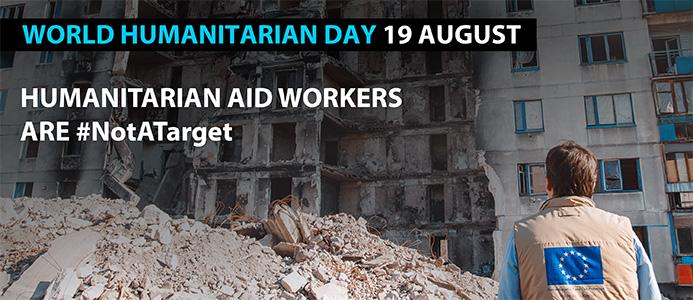
World Humanitarian Day, held every year on 19 August, marks the anniversary of the 2003 bombing of the UN headquarters in Baghdad, Iraq, when 22 humanitarian workers were killed. Ever since, the date is an opportunity to remember those who have lost their lives, but also to strengthen the global understanding of and respect for International Humanitarian Law (IHL).
The humanitarian community is organising global campaigns to commemorate World Humanitarian Day, advocating for the safety and security of humanitarian aid workers, and for the survival, well-being and dignity of people affected by crises. It is an occasion to honour the dedication and bravery of humanitarian workers who put their lives on the line to save others.
Insecurity often prevents the delivery of aid where it is needed the most. Access to, and the protection of the most vulnerable, continue to be challenged due to the widespread and growing lack of compliance with IHL and the humanitarian principles. The percentage of civilian victims in conflicts has increased dramatically, and the security of humanitarian personnel has continued to decline for years.
Almost 4 400 humanitarian workers have been victims of major attacks over the past two decades. In 2017 alone, 143 major attacks were perpetrated against aid operations, affecting 288 humanitarian workers in 21 countries. As in previous years, national staff members were particularly vulnerable, constituting the vast majority, i.e. 92% of attack victims. Every month in 2017, on average 11 humanitarian workers were killed, more than seven were wounded, and more than five were kidnapped.
Almost four times as many aid workers were killed in 2017 as in 1998, almost four times as many were kidnapped, while almost six time as many were wounded. Some of the most dangerous places for humanitarian aid workers are Afghanistan, Sudan, South Sudan, Somalia, Pakistan, Nigeria, DR Congo, Syria, Iraq, and the Central African Republic. About 75% of the global numbers of wounded aid workers are in these ten countries (Source: Aid Worker Security Database).
World Humanitarian Day is an opportunity to inform as many people as possible about the life-saving work of humanitarians, and the dangers they face every day.
For its part, the European Union (EU) is firmly committed to promoting global respect for and compliance with International Humanitarian Law, and the principles that guide humanitarian action – humanity, impartiality, neutrality and independence. The EU contributes to the global respect for and compliance with IHL through advocacy and political, diplomatic and communication measures.
For further information please read our International Humanitarian Law factsheet.
Follow our social media campaign for World Humanitarian Day on Twitter, Facebook and Instagram and join the conversation with #NotATarget.
See also how the Commission supported World Humanitarian Day 2017, 2016, 2015, and 2014.
